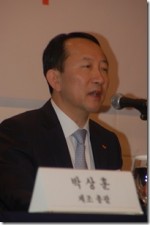
Kwon Oh-chul, CEO with Hynix Semiconductor said at a press conference held yesterday, “Dynamic random access memory (DRAM) chip prices hit a plateau and will start to paint upward curve in the second half of this year.” “Yet, how much they would bounce back will depend on the global economic recovery and supply capacity,” added he.
The memory chip industry has suffered a notoriously fickle up and down cycles, and especially in the 2 year run-up since 2010, prices of benchmark 2Gb DDR3 DRAM chips have plummeted below US$1, deeply undermining chipmakers’ profitability.
Yet, a recent bankruptcy filing by Japan’s Elpida Memory Inc. is expected to help work off some of the industry’s excess capacity.
“The court receivership by Elpida will skim off some of the overall DRAM supplies. On top of that, frozen facility investments will help the industry out of years-long supply gluts,“ Kwon said.
To gird itself for the uptick, Hynix plans to invest 4 trillion won on facility investment, and half of the amount will be spent to expand NAND flash memory chip capacity, added he.
According to him, NAND flash memory chips will likely be a hot growth area in the years to come, as SSDs, or solid state disks, will replace HDDs in large volume, spurring demand for NAND flash memory chips.
SSDs are a collection of NAND flash memory chips on a circuit board.
Hynix aims to perk up its share of NAND flash memory chips further, as the chipmaker commanded a 12% of global NAND memory chip market as of the end of 2011.
Meanwhile, Kwon didn’t rule out the possibility that Hynix will make a foray into SOC business, as its parent company SK Telecom will be able to provide a massive captive market for SOC chips, especially baseband chips for mobile phone.
It will be good for us to focus on memory chip business for a while, but we also need to carve out new growth opportunities in the SOC chip market,” asserted he.
SK Telecom, the country’s largest mobile service carrier, took over 21.5% share of Hynix in mid-February, to become the largest shareholder of the world’s No. 2 memory chip maker. And the service carrier is exploring a way to synergize the pairing of Hynix to the maximum.
Hynix posted a net loss of 239.9 billion won in the fourth quarter, falling a prey to freefalls in memory chip prices.
By Austin Jung

